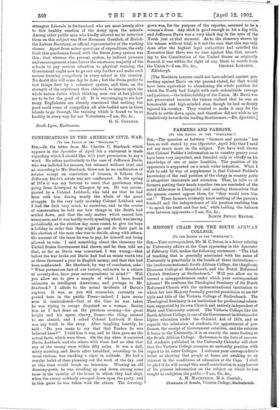CONFISCATIONS IN THE AMERICAN CIVIL WAR.
(TO THE EDITOR OF TEE SPECTATOE."1 SIB,—In the letter from Mr. Charles C. Starbuck which appears in the Spectator of April 5th a statement is made regarding which I should like, with your permission, to say a 'word. He refers particularly to the case of Jefferson Davis, who was indicted for treason, but released without trial, and as, according to Mr. Starbuck, there can be no confiscation of estates except on conviction of treason, it follows that Jefferson Davis's estate was not confiscated. In the spring of 1874 it was my fortune to meet that gentleman when going from Liverpool to Glasgow by sea. He was accom- panied by a Colonel Lubbock, who told me that he had been with him during nearly the whole of the great struggle. In the very early morning Colonel Lubbock and I had the deck very much to ourselves, and in the course of conversation he told me how things in the South had settled down, and that the only matter which caused him annoyance, and it was hardly worth speaking about, was having periodically, as the election day came round, to give his boys a holiday in order that they might go and do their part in the election of the man who was to decide, along with others, the amount of the taxes he was to pay, he himself not being allowed to vote. I said something about the clemency the United States Government had shown, and he then told me that, so far as Davis was concerned, I was wrong,—that before the war broke out Davis had had an estate worth two or three thousand a year in English money, and that this had been confiscated. Mr. Starbuck, by way of conclusion, asks : " What portentous fact of our history, unknown to a citizen of seventy-five, have your correspondents in mind ?" Will you allow me to give a sample of what I have found unknown to intelligent Americans, and perhaps to Mr. Starbuck ? I allude to the actual incidents of Davis's capture. It was, as you will remember, currently re- ported here in the public Press—indeed, I have never seen it contradicted—that at the time he was taken he was trying to escape disguised as a woman. Seeing him as I had done on the previous evening—his great height and his spare, sinewy, frame—the thing seemed to me absurd, and I asked Colonel Lubbock if there was any truth in the story. After laughing heartily, he 'said : " Do you mean to say that that Yankee lie was believed here ?" I told him it was, and he then gave me the actual facts, which were these. On the day when it occurred Davis, Lubbock, and the others with them had no idea that any of the enemy were within fifty miles. It was a dull, misty morning, and Davis after breakfast, according to his usual custom, was smoking a cigar in solitude. He had a regular habit of then planning out the work of the day, and at this time would brook no intrusion. Wearing an old dressing-gown, he was strolling up and down among some trees in the vicinity of the house in which they had slept, when the enemy suddenly swooped down upon the party, and in this guise he was taken with the others. The dressing. gown was, for the purpose of the reporter, assumed to be a woman's dress. Any stick is good enough to hit a dog and Jefferson Davis was a very black dog in the eyes of the North just at that moment. As to the clemency shown by his release without trial, is it not the case that this was only done after the highest legal authorities had satisfied the Executive that there was no case against him, that, accord- ing to, the Constitution of the United States as originally framed, it was within the right of any State to secede from [The Northern lawyers could not have advised against pro, ceeding against Davis on the ground stated, for that would have been equivalent to abandoning the whole position for which the North had fought with such indomitable courage and patience,—the indissolubility of the Union. Mr. Davis was not prosecuted because the victors realised that he was an honourable and high-minded man, though he had so deeply injured his country. They wanted to make it easy for the South to settle down again, and therefore did not wish to act vindictively towards the leading Southerners.—En. Spectator.]










































 Previous page
Previous page